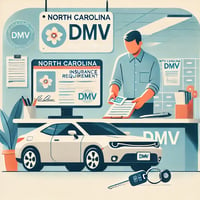When you buy a car in North Carolina, getting it registered is a key step before hitting the road....
Non-Owners Insurance NC: What North Carolina Drivers Need to Know
 If you drive but don’t own a car in North Carolina, you might still need insurance. Non-owners insurance is a policy designed for drivers who frequently borrow or rent vehicles but don’t have a car registered in their name. This type of coverage provides liability protection in case you’re at fault in an accident, helping cover bodily injury and property damage costs. In this article, we’ll explore what non-owners insurance covers, who needs it, and how it can protect you on the road.
If you drive but don’t own a car in North Carolina, you might still need insurance. Non-owners insurance is a policy designed for drivers who frequently borrow or rent vehicles but don’t have a car registered in their name. This type of coverage provides liability protection in case you’re at fault in an accident, helping cover bodily injury and property damage costs. In this article, we’ll explore what non-owners insurance covers, who needs it, and how it can protect you on the road.
What is Non-Owners Insurance?
Non-owners insurance is a type of auto insurance that provides liability coverage for drivers who don’t own a vehicle. Unlike standard auto insurance, it only covers damage or injury to others if you’re at fault in an accident. Non-owners insurance typically doesn’t cover damage to the car you’re driving, nor does it cover injuries you may sustain.
Key Features of Non-Owners Insurance
- Liability Coverage Only: Non-owners insurance includes bodily injury and property damage liability but generally does not include collision or comprehensive coverage.
- Uninsured Motorist Coverage: This coverage can help if you’re involved in an accident with a driver who doesn’t have insurance.
- No Physical Damage Coverage: Non-owners insurance will not pay for repairs to the vehicle you’re driving if you cause an accident.
Who Needs Non-Owners Insurance in North Carolina?
Non-owners insurance is ideal for people who frequently drive cars they don’t own. Here are some common situations where non-owners insurance is a good choice:
1. Drivers Who Frequently Rent Cars
If you rent cars often, non-owners insurance can be more cost-effective in the long run than buying liability coverage from the rental company each time. It covers your liability, so you only need to add a collision damage waiver from the rental agency to cover the vehicle itself.
2. People Who Borrow Cars
Non-owners insurance is helpful if you frequently borrow cars from friends or family members. If you cause an accident while driving someone else’s car, the owner’s insurance will usually cover initial damages, but your non-owners policy can help with any costs beyond the owner's liability limits.
3. Individuals with a Suspended License
In North Carolina, if your license has been suspended, you may need to provide proof of insurance to get it reinstated. A non-owners policy can meet this requirement, allowing you to fulfill the SR-22 or FR-44 filing that’s often required after violations like DUIs.
4. People Between Vehicles
If you recently sold your car or are between vehicles, non-owners insurance can help you maintain continuous coverage. This way, you avoid a lapse in insurance, which can lead to higher rates when you buy a new policy.
What Does Non-Owners Insurance Cover?
Non-owners insurance generally provides the following coverages:
- Bodily Injury Liability: Covers medical expenses for other people injured in an accident you cause, up to your policy limits.
- Property Damage Liability: Pays for damage to other people’s property, like their vehicle or a fence, in an accident where you are at fault.
- Uninsured Motorist Coverage: Provides coverage if you’re injured by an uninsured or underinsured driver. In North Carolina, uninsured motorist coverage is often included to protect drivers in these situations.
While these coverages help you meet North Carolina’s insurance requirements, non-owners policies typically don’t include:
- Collision Coverage: This would pay for damages to the vehicle you’re driving in an accident you cause, but it’s not available in non-owners policies.
- Comprehensive Coverage: Coverage for non-collision-related damages, like theft or weather damage, is not part of non-owners insurance.
- Personal Injury Protection (PIP): Non-owners insurance generally doesn’t include PIP or medical payments coverage for injuries you sustain in an accident.
Benefits of Non-Owners Insurance
Choosing non-owners insurance can be beneficial for several reasons:
- Affordable Liability Coverage: Non-owners insurance is usually more affordable than a standard auto policy, making it a budget-friendly way to stay covered without owning a vehicle.
- Meeting State Requirements: If you need to reinstate your license, non-owners insurance can fulfill state-mandated liability requirements in North Carolina.
- Avoiding a Lapse in Coverage: Maintaining continuous insurance coverage helps keep your rates lower. Non-owners insurance is a great way to stay insured between cars or during times you’re not driving your own vehicle.
- Peace of Mind When Borrowing or Renting Cars: Having non-owners insurance gives you added liability protection whenever you borrow or rent a car, providing peace of mind on the road.
How to Get Non-Owners Insurance in North Carolina
To obtain a non-owners policy, you’ll typically need to provide:
- Driver’s License: Proof of your current driver’s license status.
- Driving Record: Information about your driving history, as this can affect your premium.
- Desired Coverage Levels: Choose coverage levels that meet or exceed North Carolina’s minimum requirements: $30,000 for bodily injury per person, $60,000 for bodily injury per accident, and $25,000 for property damage.
You can request a non-owners insurance quote from most auto insurance providers. Make sure to compare quotes and ask about any discounts you might qualify for to get the best rate.
FAQs About Non-Owners Insurance
Can I get non-owners insurance if I live with someone who has a car?
No, non-owners insurance is not for people who have regular access to a household car. In that case, you should be listed as a driver on the vehicle owner’s insurance policy.
Does non-owners insurance cover rental car damage?
Non-owners insurance only provides liability coverage. It doesn’t cover collision or comprehensive damage to the rental car itself. You may need to purchase a collision damage waiver from the rental agency for complete protection.
Is non-owners insurance required for SR-22 filings in North Carolina?
Yes, if you need an SR-22 for license reinstatement, a non-owners policy can fulfill the insurance requirements in North Carolina.
Conclusion
Non-owners insurance in North Carolina provides essential liability coverage for drivers who don’t own a car but still drive occasionally. Whether you rent vehicles, borrow cars, or need insurance to reinstate your license, a non-owners policy can offer affordable protection. By understanding your needs and comparing policies, you can stay insured without the cost of a full auto policy.
Ready to get non-owners insurance in North Carolina? Contact us today to find the best coverage for your driving needs!



